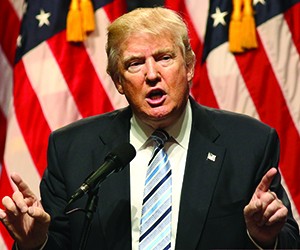Donald Trump became the 45th president of the United States of America Jan. 20. Amid the continuing rancor and speculative analysis ignited by his election, the moment of true reckoning—how Mr. Trump and his administration will govern and lead U.S. affairs—is now at hand.
With campaign pledges including restrictive new measures on the movement of people, critical review of international trade agreements and protectionism for U.S. carriers against Middle Eastern competitors, direct and indirect impacts on the travel and hospitality industries—meetings naturally included—are a hotbed of concern.
Will temperatures continue to rise under the Trump presidency, toward possible downturn or even meltdown, or will “jets cool” via promises of economic stimulation and growth? Five industry leaders and experts weigh in on potential impacts of the new administration on travel, hospitality and meetings.
Roger Dow, President and CEO,
U.S. Travel Association
Increased focus on domestic infrastructure is one potential positive impact. Throughout his campaign, President-elect Trump demonstrated that travel and infrastructure issues have his attention. Our nation’s airports, roads and rails are in dire need of modernization, and Mr. Trump recognizes this. Smart, focused investment in infrastructure will lead to more business and leisure travelers, and a healthy travel economy.
Another is greater connectivity through Open Skies. The president-elect’s extensive business and hospitality background gives us confidence that his administration will support policies that strengthen Open Skies agreements with other nations. Our country is the largest exporter of global long-haul travel, and increasing the number of flights operating to and from the U.S. is a boon for local economies. The travel industry encourages President-elect Trump to follow the precedent set by federal leaders, such as the recent decision that permitted Norwegian Air International to expand service to the United States.
Speaking of hospitality, this same background that gives us hope about the president-elect’s potential stance on Open Skies leads us to believe he will embrace the security and economic benefits of the Visa Waiver Program (VWP). The VWP allows pre-screened travelers from 38 partner countries to travel visa-free to the U.S. for business or leisure purposes for up to 90 days, and these international visitors, who spend money at our hotels, attractions, restaurants, retail shops and transportation providers, will create American jobs along the way. The VWP is an economic powerhouse wrapped in a vital security tool. Supporting it is a win-win for the Trump administration.
Vanessa Sinders, Senior Vice President of Government Affairs,
American Hotel & Lodging Association (AHLA)
As an industry that supports 8 million jobs around the country and contributes nearly $600 billion to the American economy each year, it’s critical that this new administration advances policies that boost the economy, encourage entrepreneurship and business growth, ensure consumers are protected in the ever-evolving online distribution space, support infrastructure development, and promote travel and tourism across the United States.
With three out of every five hotels considered small businesses in the United States, we look forward to working with the new administration to ensure workforce flexibility and a fair and equitable work environment, as well as the ability to create jobs and improve the career paths of those in the workforce. We also hope to raise awareness on the rise of often illicit commercial activity fostered by short-term rental companies and the need to curb deceptive marketing practices throughout the online hotel booking process to ensure ample consumer choice and transparency.
Further, as a powerful economic driver, securing more than six years of consecutive job creation and economic growth, it is imperative that we continue advocating for policy initiatives that promote tourism, including issues like the Visa Waiver Program to strengthen business and leisure travel, and efforts to bolster important travel infrastructure here at home.
AHLA is committed to positive engagement with the new administration and Congress to tackle the many important challenges and opportunities facing our nation and industry.
Michael Dominguez, Chief Sales Officer,
MGM Resorts International
As President-elect Trump has laid out an aggressive legislative agenda for his first 100 days, the travel and tourism industry is well positioned to benefit from this focus. Three of his top priorities as communicated so far include the following: infrastructure investment, a focus on positive trade for the United States and aggressive job growth. Knowing that our community has been an advocate for infrastructure investment for the past few years as we prepare for a continued growth in international visitation, that the travel and tourism industry is the No. 2 export in the U.S. and has been one of the largest drivers of jobs during this recovery, puts us in a great position to be a vehicle for this growth. Add to the equation that President-elect Trump knows and understands the travel industry, and we as an industry are positioned with a head start.
The only negatives for our industry that could potentially arrive would be dictated by the shape and form that new trade agreements could take as well as positions regarding our relationships with specific countries. In all candor, it is just a bit premature to know.
PageBreak
Anthony Melchiorri, Hospitality Expert and Creator and Host,
Travel Channel’s Hotel Impossible
My familiarity with Mr. Trump goes back to his ownership of the Plaza Hotel in New York City, where I worked at the time. He is a businessman first, with an obvious capitalistic view. Gauging by how the stock market has responded so far, there appears to be a feeling that he can bring tremendous growth and revenue to the U.S. system. Business is based on optimism, so it follows that if he does what he says he is going to do, including bringing back jobs and strengthening the economy, then it’s reasonable to expect a corresponding lift for the hospitality, travel and meetings sectors.
I could venture, for instance, that who better than a businessman experienced in running hotels to have a positive influence on the hotel business? On the other hand, the only certain, or predictable, factor about Mr. Trump is that he is unpredictable. With some 52 million foreign visitors to New York City alone last year, the U.S. tourism industry relies heavily on international arrivals. If the message and perception is one of welcome, people will presumably continue to come. On the other hand, if he promotes initiatives around isolationism and protectionism, international tourism may fall and negatively impact hotels and meetings.
On Hotel Impossible, viewers see me make quick decisions and take fast action. By nature, however, I am very conservative, and so for now, my view is to let everything settle down and see how his economic plan develops and unfolds. Only time will tell if he is a smart businessman thinking six steps ahead, or something less. And for hoteliers, my advice, true anytime, is to worry less about what’s happening in the White House and concentrate on your property. From guest experiences to revenue management, manage the action around your own house, nose to the grindstone, as if you could go out of business tomorrow.
Glenn Haussman, Hospitality Trend Analyst, Host,
No Vacancy Podcast and Hotel Industry Speaker
The Trump presidency will be significantly more challenging for the meetings and hospitality [industry] than industry insiders believe. Meetings and hotel business are at the peak, and the inevitable downturn could be much deeper if promised policies are put into place.
On the positive side, it’s likely Trump will enact policies that are pro-hotel owner, many of whom were staunch election-cycle supporters. He could quash the move to a $15 per hour minimum wage, support anti-union National Labor Relations Board appointments, and potentially enact small business tax benefits. While beneficial to hotel owners, it would come at the expense of employee satisfaction.
The larger concern is Trump’s apparent anti-global approach to business. He appears to be rolling back progress made with Cuba, which would squelch American investment, thereby keeping American hoteliers from profiting in this untapped market. Plus, staunch isolationist policies could encourage foreign governments to retaliate, making it harder for U.S. hotel company expansion in certain markets such as China. Trump has also promised significant Chinese imports tariffs, yet the clear majority of hotel products are made in China. If promised 45 percent tariffs are enacted, it would cause massive problems for hoteliers stuck with skyrocketing costs in a hotel market already at peak pricing.
Additionally, Trump has vowed to make it more difficult for visitors to enter the U.S. His “America-first” approach essentially tells foreigners they’re not welcome anymore. Last year, the U.S. enjoyed 77.5 million international visitors, says U.S. Travel. Many will now go elsewhere, causing billions in lost revenue.




